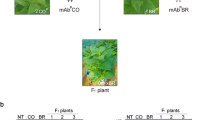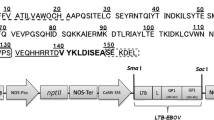Abstract
Immunotherapy holds great promise for treatment of infectious and malignant diseases and might help to prevent the occurrence and recurrence of cancer. We produced a plant-derived tumor-associated colorectal cancer antigen EpCAM (pGA733) at high yields using two modern plant expression systems. The full antigenic domain of EpCAM was efficiently purified to confirm its antigenic and immunogenic properties as compared to those of the antigen expressed in the baculovirus system (bGA733). Recombinant plant-derived antigen induced a humoral immune response in BALB/c mice. Sera from those mice efficiently inhibited the growth of SW948 colorectal carcinoma cells xenografted in nude mice, as compared to the EpCAM-specific mAb CO17-1A. Our results support the feasibility of producing anti-cancer recombinant vaccines using plant expression systems.



Similar content being viewed by others
Abbreviations
- TAA:
-
Tumor-associated antigen
- EpCAM/GA733:
-
Colorectal cancer-associated antigen
- bGA733:
-
Baculovirus-derived GA733-2
- pGA733:
-
Plant-derived GA733-2
- mAb:
-
Monoclonal antibodies
References
Armstrong A, Eck SL (2003) EpCAM: a new therapeutic target for an old cancer antigen. Cancer Biol Ther 2:320–326
Boehm R (2007) Bioproduction of therapeutic proteins in the 21st century and the role of plants and plant cells as production platforms. Ann N Y Acad Sci 1102:121–134
Brady LJ (2005) Antibody-mediated immunomodulation: a strategy to improve host responses against microbial antigens. Infect Immune 73:671–678
Brodzik R, Bandurska K, Deka D, Golovkin M, Koprowski H (2005) Advances in alfalfa mosaic virus-mediated expression of anthrax antigen in planta. Biochem Biophys Res Commun 338(2):717–722
Brodzik R, Glogowska M, Bandurska K et al (2006) Plant-derived anti-Lewis Y mAb exhibits biological activities for efficient immunotherapy against human cancer cells. Proc Natl Acad Sci USA 103:8804–8809
Choudhury A, Mosolits S, Kokhaei P et al (2006) Clinical results of vaccine therapy for cancer: learning from history for improving the future. Adv Cancer Res 95:147–202
Dalgleish AG, Whelan MA (2006) Cancer vaccines as a therapeutic modality: the long trek. Cancer Immunol Immunother 55:1025–1032
Emens LA (2006) Roadmap to a better therapeutic tumor vaccine. Int Rev Immunol 25:415–443
Fox JL (2006) Turning plants into protein factories. Nat Biotechnol 24:1191–1193
Gleba Y, Klimyuk V, Marillonnet S (2005) Magnifection—a new platform for expressing recombinant vaccines in plants. Vaccine 23:2042–2048
Gleba Y, Klimyuk V, Marillonnet S (2007) Viral vectors for the expression of proteins in plants. Curr Opin Biotechnol 18(2):134–141
Goldstein DA, Thomas JA (2004) Biopharmaceuticals derived from genetically modified plants. Q J Med 97:705–716
Golovkin M, Spitsin S, Andrianov V et al (2007) Smallpox subunit vaccine produced in planta confers protection in mice. Proc Natl Acad Sci USA 104(16):6864–6869
Hodge JW, Greiner JW, Tsang KY et al (2006) Costimulatory molecules as adjuvants for immunotherapy. Front Biosci 11:788–803
Ko K, Steplewski Z, Glogowska M, Koprowski H (2005) Inhibition of tumor growth by plant-derived mAb. Proc Natl Acad Sci USA 19:7026–7030
Koprowski H (2005) Vaccines and sera through plant biotechnology. Vaccine 23:1757–1763
Ma JK-C, Chikwamba R, Sparrow P, Fischer R, Mahoney R, Twyman RM (2005) Plant-derived pharmaceuticals–the road forward. Trends in Plant Sci 10:580–585
Marillonnet S, Giritch A, Gils M, Kandzia R, Klimyuk V, Gleba Y (2004) In planta engineering of viral RNA replicons: efficient assembly by recombination of DNA modules delivered by Agrobacterium. Proc Natl Acad Sci USA 101:6852–6857
Mosolits S, Markovic K, Frodin JE, Virving L et al (2004) Vaccination with Ep-CAM protein or anti-idiotypic antibody induces Th1-biased response against MHC class I- and II-restricted Ep-CAM epitopes in colorectal carcinoma patients. Clin Cancer Res 10:5391–5402
Mosolits S, Nilsson B, Mellstedt H (2005) Towards therapeutic vaccines for colorectal carcinoma: a review of clinical trials. Expert Rev Vaccines 4:329–350
Nagorsen D, Thiel E (2006) Clinical and immunologic responses to active specific cancer vaccines in human colorectal cancer. Clin Cancer Res 12:3064–3069
Neidhart J, Allen KO, Barlow DL et al (2004) Immunization of colorectal cancer patients with recombinant baculovirus-derived KSA (Ep-CAM) formulated with monophosphoryl lipid A in liposomal emulsion, with and without granulocyte-macrophage colony-stimulating factor. Vaccine 22:773–780
Pogrebnyak N, Golovkin M, Andrianov V et al (2005) Severe acute respiratory syndrome (SARS) S protein production in plants: development of recombinant vaccine. Proc Natl Acad Sci USA 102:9062–9067
Staib L, Birebent B, Somasundaram R et al (2001) Immunogenicity of recombinant GA733–2E antigen (CO17–1A, EGP, KS1–4, KSA, Ep-CAM) in gastro-intestinal carcinoma patients. Int J Cancer 92:79–87
Szala S, Froehlich M, Scollon M et al (1990) Molecular cloning of cDNA for the carcinoma-associated antigen GA733–2. Proc Natl Acad Sci USA 87:3542–3546
Verch T, Hooper DC, Kiyatkin A, Steplewski Z, Koprowski H (2004) Immunization with a plant-produced colorectal cancer antigen. Cancer Immunol Immunother 53:92–99
Acknowledgments
We thank TJU and KCC research and animal facilities for their support; G. Golovin for greenhouse work and Dr William Wunner for providing bGA733 antigen. This work was supported by a grant from Commonwealth of Pennsylvania Department of Health to Biotechnology Foundation Laboratories (H.K.) and a grant from USDA to Biotechnology Foundation Laboratories (H.K.).
Author information
Authors and Affiliations
Corresponding author
Rights and permissions
About this article
Cite this article
Brodzik, R., Spitsin, S., Golovkin, M. et al. Plant-derived EpCAM antigen induces protective anti-cancer response. Cancer Immunol Immunother 57, 317–323 (2008). https://doi.org/10.1007/s00262-007-0366-4
Received:
Accepted:
Published:
Issue Date:
DOI: https://doi.org/10.1007/s00262-007-0366-4




